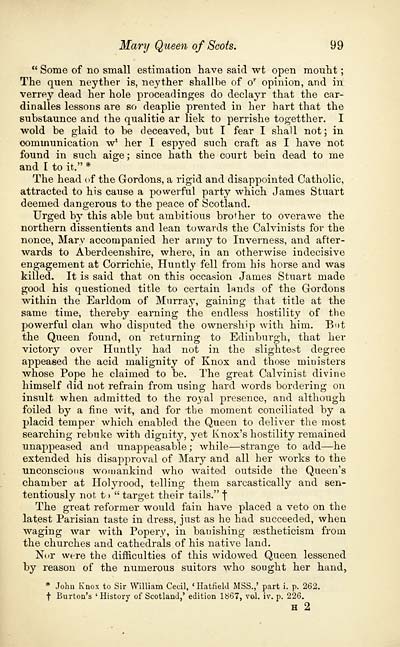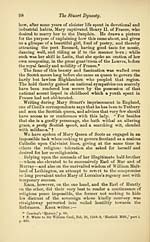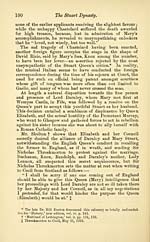Stuart dynasty
(119) Page 99
Download files
Complete book:
Individual page:
Thumbnail gallery: Grid view | List view

Mary Queen of Scots. 99
" Some of no small estimation have said wt open mount ;
The quen neyther is, neyther shallbe of o r opinion, and in
verrey dead her hole proceadinges do declayr that the car-
dinalles lessons are so deaplie prented in her hart that the
substaunce and the qualitie ar liek to perrishe togetther. I
wold be glaid to be deceaved, but I fear I shall not; in
communication w' her I espyed such craft as I have not
found in such aige ; since hath the court bein dead to me
and I to it." *
The head of the Gordons, a rigid and disappointed Catholic,
attracted to his cause a powerful party which James Stuart
deemed dangerous to the peace of Scotland.
Urged by this able but ambitious brother to overawe the
northern dissentients and lean towards the Calvinists for the
nonce, Mary accompanied her army to Inverness, and after-
wards to Aberdeenshire, where, in an otherwise indecisive
engagement at Corrichie, Huntly fell from his horse and was
killed. It is said that on this occasion James Stuart made
good his questioned title to certain lands of the Gordons
within the Earldom of Murray, gaining that title at the
same time, thereby earning the endless hostility of the
powerful clan who disputed the ownership with him. But
the Queen found, on returning to Edinburgh, that her
victory over Huntly had not in the slightest degree
appeased the acid malignity of Knox and those ministers
whose Pope he claimed to be. The great Calvinist divine
himself did not refrain from using hard words bordering on
insult when admitted to the royal presence, and although
foiled by a fine wit, and for -the moment conciliated by a
placid temper which enabled the Queen to deliver the most
searching rebuke with dignity, yet Knox's hostility remained
unappeased and unappeasable ; while — strange to add — he
extended his disapproval of Mary and all her works to the
unconscious womankind who waited outside the Queen's
chamber at Holyrood, telling them sarcastically and sen-
tentiously not t» " target their tails." f
The great reformer would fain have placed a veto on the
latest Parisian taste in dress, just as he had succeeded, when
waging war with Popery, in banishing asstheticism from
the churches and cathedrals of his native land.
Nor were the difficulties of this widowed Queen lessened
by reason of the numerous suitors who sought her hand,
* John Knox to Sir William Cecil, < Hatfield MSS.,' part i. p. 262.
f Burton's ' History of Scotland,' edition 1S67, vol. iv. p. 226.
H 2
" Some of no small estimation have said wt open mount ;
The quen neyther is, neyther shallbe of o r opinion, and in
verrey dead her hole proceadinges do declayr that the car-
dinalles lessons are so deaplie prented in her hart that the
substaunce and the qualitie ar liek to perrishe togetther. I
wold be glaid to be deceaved, but I fear I shall not; in
communication w' her I espyed such craft as I have not
found in such aige ; since hath the court bein dead to me
and I to it." *
The head of the Gordons, a rigid and disappointed Catholic,
attracted to his cause a powerful party which James Stuart
deemed dangerous to the peace of Scotland.
Urged by this able but ambitious brother to overawe the
northern dissentients and lean towards the Calvinists for the
nonce, Mary accompanied her army to Inverness, and after-
wards to Aberdeenshire, where, in an otherwise indecisive
engagement at Corrichie, Huntly fell from his horse and was
killed. It is said that on this occasion James Stuart made
good his questioned title to certain lands of the Gordons
within the Earldom of Murray, gaining that title at the
same time, thereby earning the endless hostility of the
powerful clan who disputed the ownership with him. But
the Queen found, on returning to Edinburgh, that her
victory over Huntly had not in the slightest degree
appeased the acid malignity of Knox and those ministers
whose Pope he claimed to be. The great Calvinist divine
himself did not refrain from using hard words bordering on
insult when admitted to the royal presence, and although
foiled by a fine wit, and for -the moment conciliated by a
placid temper which enabled the Queen to deliver the most
searching rebuke with dignity, yet Knox's hostility remained
unappeased and unappeasable ; while — strange to add — he
extended his disapproval of Mary and all her works to the
unconscious womankind who waited outside the Queen's
chamber at Holyrood, telling them sarcastically and sen-
tentiously not t» " target their tails." f
The great reformer would fain have placed a veto on the
latest Parisian taste in dress, just as he had succeeded, when
waging war with Popery, in banishing asstheticism from
the churches and cathedrals of his native land.
Nor were the difficulties of this widowed Queen lessened
by reason of the numerous suitors who sought her hand,
* John Knox to Sir William Cecil, < Hatfield MSS.,' part i. p. 262.
f Burton's ' History of Scotland,' edition 1S67, vol. iv. p. 226.
H 2
Set display mode to:
![]() Universal Viewer |
Universal Viewer | ![]() Mirador |
Large image | Transcription
Mirador |
Large image | Transcription
Images and transcriptions on this page, including medium image downloads, may be used under the Creative Commons Attribution 4.0 International Licence unless otherwise stated. ![]()
| Histories of Scottish families > Stuart dynasty > (119) Page 99 |
|---|
| Permanent URL | https://digital.nls.uk/94819194 |
|---|
| Description | A selection of almost 400 printed items relating to the history of Scottish families, mostly dating from the 19th and early 20th centuries. Includes memoirs, genealogies and clan histories, with a few produced by emigrant families. The earliest family history goes back to AD 916. |
|---|

